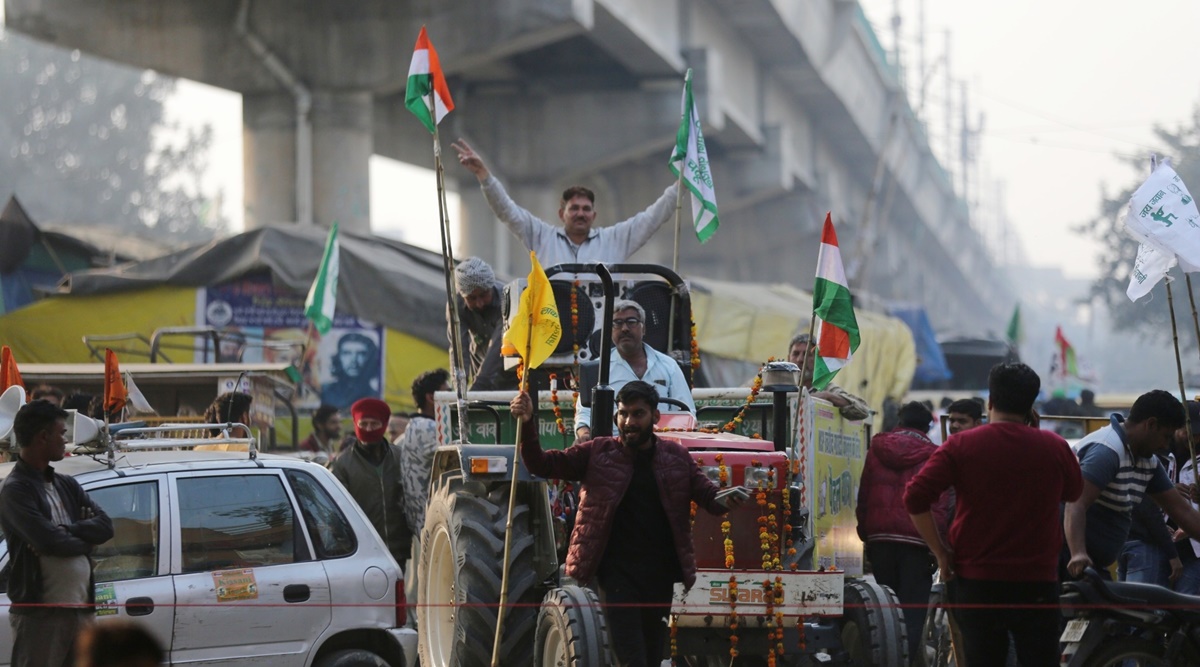The protest had presented an unprecedented political crisis for the NDA Government, including the loss of a key ally, and drawn the attention of the Supreme Court. The Samyukta Kisan Morcha (SKM), which is an umbrella body of about 40 protesting farm unions, said that with the Centre agreeing to several demands, “the current agitation stands suspended”.

The SKM said that it has received “a formal letter” from the Government “agreeing to several pending demands of the protesting farmers”. It said that the SKM “formally announces the lifting of the morchas at Delhi borders on national highways and various other locations in response”.
“Current agitation stands suspended — battle has been won and the war to ensure farmers’ rights, especially to secure MSP as a legal entitlement for all farmers, will continue,” the SKM said.
“It is a historic victory. The Government had to repeal the three laws that were anti-farmer, anti-people and in the interests of corporates. For one year, farmers from all states braved the weather, Covid, defamation…and camped at the borders of Delhi,” Ashok Dhawale, who is a member of the five-member panel that negotiated with the Centre, said.
However, Dhawale said several issues remain unresolved. “MSP, debt, adivasi land, farm insurance scheme…that is why the SKM will remain and continue to raise the demands of the farmers with more force,” he said.
Bharatiya Kisan Union (BKU) leader Balbir Singh Rajewal said: “Today, we are leaving after defeating a dictatorial government. On January 15, SKM will meet again to review if the Government takes back the cases it has slapped on protesters and if it acts on other demands.”
Another BKU leader Gurnam Singh Chaduni said: “Every month we will review in our meetings the commitments made by the Government.” BKU’s Rakesh Tikait said: “I will go to Darbar Sahib in Amritsar to pay obeisance and then to my village.”
Story continues below this ad
ExplainedPolls in Punjab & UP, timing is key
The farm agitation's end comes at a politically delicate time for the ruling BJP with key elections slated to come up in Uttar Pradesh and Punjab, the two regions at the heart of the protests. All eyes are now on how the Government follows up on its assurances.
Yogendra Yadav, Swaraj India leader, said the farmers will celebrate “Vijay Diwas’’ on December 11, after which they will start returning home. “We decided to put off celebrations by a day because of the tragic demise in a chopper crash of the Chief of Defence Staff and other defence personnel,” he said.
Referring to the key demand on minimum support price, Yadav said: “On MSP, the Government has given an assurance that procurement will take place at existing prices. They have given an assurance in writing. But it is a vaguely worded promise. I do not feel that on MSP, there is anything substantive as of now. But it has given us a foothold to discuss our demands in the committee.”
The agitation, which drew farmers mainly from Punjab, UP and Haryana, was suspended a fortnight after both Houses of Parliament repealed the new laws. In the days that followed, the Centre and SKM engaged in hectic parleys and exchanged two sets of draft agreements that included key conditions apart from the repeal: a committee to decide on MSP, the promise of discussions on the electricity bill, softer laws against stubble-burning and the assurance that all cases against protesters during the agitation will be withdrawn.
On Thursday, the Government’s one-page letter, signed by Union Agriculture Secretary Sanjay Agrawal, said: “As far as the cases related to the farmers’ protest are concerned, the governments of UP, Uttarakhand, Himachal Pradesh, Madhya Pradesh and Haryana have fully agreed that all the agitation related cases will be withdrawn with immediate effect.”
Story continues below this ad
The top official indicated that cases registered by Central agencies will also be withdrawn. “It is also agreed to withdraw with immediate effect all the cases related to the agitation made against the agitators and supporters by the concerned departments and agencies of the Government of India and in all the Union Territories including Delhi during the farmers’ movement,” the letter said.
On the demand for a legal guarantee on MSP, the letter reiterated the Government’s stand that the existing system of MSP-based procurement will continue, for now.
The letter, however, “clarified that the representatives of the SKM will also be included in the farmer’s representatives” on the committee that will be formed to discuss this issue. “One of the mandates of the committee would be how to ensure that farmers of the country avail the MSP,” the letter said.
Responding to the demand for compensation to the families of farmers who died during the protest, the Government said Haryana and UP have given “in-principle” consent and that the Punjab government has already made an announcement. Punjab has announced Rs 5 lakh and a job to each family.
Story continues below this ad
On the other key demands, the letter said: “The provisions affecting farmers in the Electricity Bill will first be discussed with all the stakeholders/ Samyukta Kisan Morcha. The Bill will be introduced in Parliament only after discussion with the Morcha.”
Referring to the Commission for Air Quality Management in National Capital Region and Adjoining Areas Act, 2021, it said: “As far as the issue of stubble is concerned, Section 14 and 15 of the law passed by the Government of India has excluded farmers from criminal liability.”
In conclusion, the Government said that “the five pending demands are resolved”. “Now there is no justification for continuing the farmers’ protest. Therefore, it is requested that in the light of the above, farmers should end the agitation,” it said in the letter.
It was in September last year the protests gathered strength after the farm laws were cleared in Parliament: The Farmers (Empowerment and Protection) Agreement of Price Assurance and Farm Services Bill, 2020; The Farmers Produce Trade and Commerce (Promotion and Facilitation) Bill, 2020; and The Essential Commodities (Amendment) Bill, 2020.
Story continues below this ad
The key concern was that the new laws would end the existing Agricultural Produce Market Committee (APMC) mandis and the decades-old ecosystem around it, including commission agents. Within days, the NDA’s key Punjab partner, Shiromani Akali Dal, exited the coalition.
As the agitation escalated, the Union Agriculture Ministry held the first round of talks with 29 representatives of farm unions on October 14, 2020. In all, 11 rounds of talks were held between the Government and farm representatives since then, but in vain.
On January 12, 2021, the Supreme Court stayed the implementation of the laws and formed a committee that submitted its report on March 19 —the report is yet to be made public.
On the ground, meanwhile, hundreds of farmers arrived from Punjab, UP and Haryana to stage a sit-in protest led by SKM at the Singhu border on November 26, 2020, triggering violent clashes between Delhi Police and the protestors. Several agitations followed with the protests spreading to other sites.
(With Amil Bhatnagar)










